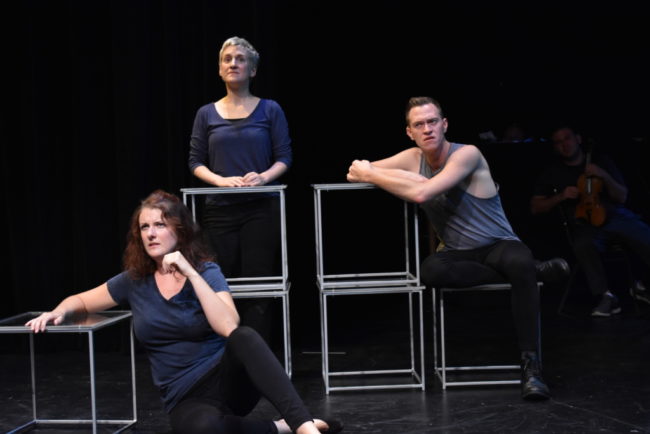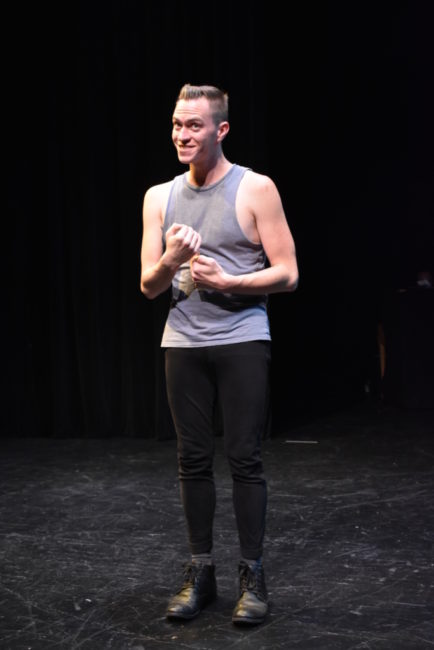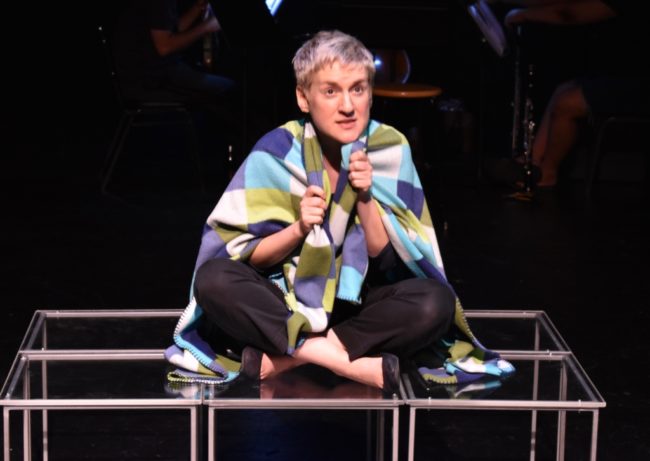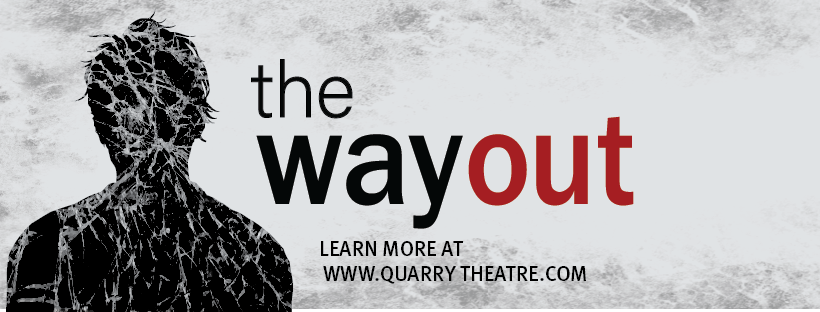When someone leaves, a piece of you leaves with them. And while that is a generally understood pathos principal of the grieving process, we as a society don’t fully accept or acknowledge this when it comes to suicide. We say “suddenly” or “passed unexpectedly” or “died at home” rather than the blunt, honest truth of “lost the battle with…depression, substance abuse, mental illness…” and the taboo and stigma that remain shrouded around suicide and mental illness keeps us from opening up our minds and hearts to this grieving process. Quarry Theatre presents an 85-minute work, The Way Out, which thoroughly examines suicide and mental illness, priming the audience for conversations about these sensitive, emotionally loaded topics. Playing for just two weekends at the Baltimore Theatre Project in the upper-Mt. Vernon neighborhood of Baltimore, this original work— conceived and directed by Ryan Clark, with music composed by Patrick Alexander— is a necessary experience for anyone who has ever struggled with the loss of a loved one due to suicide, has ever struggled with suicidal ideation or intention, and in general for everyone living and breathing as a human being in society today.

Director and Conceiver Ryan Clark has crafted 17 staves that spin around one another, interweaving over each other to tell the tale of suicide; facts and anecdotes, expressions and experiences are all woven into this short work which attempts to shed light on the deeply complex and heavily layered topic that is suicide. Despite the overture lingering on a far bit too long for comfort (with a series of gesture-driven, repetitive interpretive dances that set a frenetic frenzy into the ether that is never quite retracted), the piece is riveting and compelling in all that it says and does. Alex Shade, one of three performers in the production, serves as the show’s choreographer and this is the only place where the show itself feels somewhat disjointed. There are great chunks of the show devoted to interpretive dance-based movement, and although there are moments when this really connects and lands with what’s being explained, spoken, and explored (like during “The Brain” where Shade delivers a striking series of movements that interpretively align with the various functions of the brain), on the whole most of these movements feel distracting and pull the audience’s attention away from what appears to be the more important elements of the experience.
Composer and musical conductor Patrick Alexander has crafted an exquisitely emotional score that ebbs and flows throughout the 17 staves. Only once or twice is there a movement of the 17 that is delivered without the musical accompaniment. Alexander’s music is erratic and jarring at times; this feels fitting given the nature of mental illness and suicide as it is discussed and presented in this work. Alexander also does an extraordinary job of finding balance with his four live musicians (Stacey Antoine on flute and clarinet, Jonathan Goren on violin, Chanel Whitehead on cello, and William Zellhofer on piano). The score is strong but the volume is not overbearing. Words often do not do the emotions evoked from Alexander’s score justice, but it can be said that Alexander’s compositions are paired perfectly with the feelings that accompany this experience.

One of the more gut-wrenching staves in the production is “To Be” delivered about three-quarters of the way through the performance. Alex Shade takes the all-too familiar soliloquy from Hamlet and presents it rather simply, except in the context and with his careful cadence, the contemplation of suicide becomes a harrowing speech that just draws forth the tears. Shade delivers stellar character work throughout (little hints of costume, designed by Georgie Williams, change ‘characters’ and ‘personas’ when the need arises) the performance, with one of his more notably memorable moments being during the stave called “Mike.” This movement in the piece is an anecdote, revolving around the loss of someone close and how the ‘other person’ is coping, grieving, existing after their loved one’s suicide.

Laura Holland shares a different side of the experience, during a stave called “The Little Moments”; she narrates a tale of being a suicide survivor, appreciating all the little things and sharing her gratitude for overcoming that instance when she felt suicidal. Holland, along with Shade and Deirdre McAllister iterate and reiterate the truth of suicidal feelings and ideations throughout the performance, homing in on the fact that there is no cure but there is hope and coping strategies. Holland has one of the heavier anecdotal experiences in the performance during a stave near the show’s conclusion called “Close-Distant” recounting a story of her character’s lost little sister.
Deirdre McAllister also explores the sobering experience of being a mom who has lost a young teen to suicide in the stave entitled “You Can’t Have the Same Jane.” The emotional rawness with which she confronts this tale is haunting. During the final segment of the production, “Coda: Hope” each of the characters or incarnations of these real-life narratives makes a reprisal with something hopeful to say, a different way of shedding light on the darkest of situations. There is valuable information laced all throughout the production, everything from statistics to coping mechanisms, to destigmatization to hope. It is an emotionally potent piece that should be seen and should be shared. Quarry Theatre has landed on a topic that impacts far too may of us and has an important message to spread through their voice of theatrical advocacy. The Way Out is difficult to swallow but cathartic in its own right and a must-see despite its triggering topical nature.
Running Time: Approximately 85 minutes with no intermission
The Way Out plays through August 31, 2019 with Quarry Theatre at The Baltimore Theatre Project— 45 W. Preston Street in the Mt. Vernon neighborhood of Baltimore, MD. For tickets call the box office at 410-752-8558 or purchase them online.
National Suicide Prevention Hotline: 1-800-273-8255
Crisis Text Line: text TALK to 741741
Trans Lifeline: 1-877-565-8860

